In the rapidly evolving landscape of Web3, asset tokenization platform has emerged as a groundbreaking concept with the potential to revolutionize the way we perceive and interact with traditional assets. By leveraging blockchain technology, asset tokenization companies offer a novel approach to representing, managing, and exchanging real-world assets in a digitized and decentralized ecosystem. This article explores the transformative power of asset tokenization in web3 and its implications across various industries.
Asset tokenization platform involves converting real-world assets, such as real estate, artworks, commodities, or even intellectual property, into digital tokens on a blockchain network. Each token represents a fraction of the underlying asset, allowing for fractional ownership and enabling a broader base of investors to participate. These tokens are programmable, traceable, and secure, thanks to the immutability and transparency of blockchain technology.
One of the key advantages of asset tokenization platform is increased liquidity. By tokenizing assets, previously illiquid investments can be divided into smaller units, unlocking access to a larger pool of potential investors. Fractional ownership also allows for more flexibility in trading, as tokens can be easily bought, sold, or exchanged on decentralized marketplaces. This democratization of asset ownership empowers individuals who may not have had the means or opportunity to invest in high-value assets traditionally.
Furthermore, asset tokenization companies bring transparency and efficiency to the process of asset management and transfer. Blockchain-based smart contracts automate and streamline the various stages of ownership, including verification, transfer of ownership, and distribution of profits or dividends. These smart contracts execute predefined rules without the need for intermediaries, reducing costs, minimizing delays, and enhancing trust between parties involved. The transparency provided by the blockchain also ensures that the history and provenance of the asset can be easily traced, mitigating fraud and enhancing trust in the market.
In the real estate industry, asset tokenization companies have the potential to disrupt the way properties are bought, sold, and financed. Tokenized real estate enables fractional ownership, allowing individuals to invest in a diversified portfolio of properties, regardless of their financial capabilities. This opens up new avenues for crowdfunding and democratizes access to lucrative real estate investments. Moreover, tokenized properties can be traded 24/7 on decentralized platforms, increasing liquidity and facilitating faster transactions compared to traditional real estate markets.
Art and collectibles, an industry traditionally reserved for high-net-worth individuals and art connoisseurs, are also being transformed by asset tokenization. Tokenizing artworks allows investors to own fractions of masterpieces, expanding investment opportunities and democratizing the art market. Additionally, the transparent and immutable nature of blockchain ensures the authenticity and provenance of art pieces, combating issues related to forgery and theft.
The benefits of asset tokenization platform extend beyond financial assets. Intellectual property, such as patents, trademarks, and copyrights, can also be tokenized, allowing creators to monetize their intellectual assets more efficiently. By tokenizing intellectual property rights, creators can license or sell their assets directly to consumers or businesses in a transparent and automated manner, reducing the complexity and costs associated with traditional licensing agreements.
While asset tokenization in web3 presents immense potential, it is not without challenges. Regulatory frameworks and legal considerations vary across jurisdictions, necessitating clear guidelines and standards to govern the tokenization of assets. Additionally, ensuring the security of tokenized assets and protecting investors from fraud or hacking attempts remains a critical concern.
In conclusion, asset tokenization in Web3 is reshaping the way we perceive and interact with traditional assets. Through fractional ownership, increased liquidity, transparency, and efficiency, asset tokenization democratizes access to investments, unlocks value in previously illiquid assets, and simplifies the management and transfer of assets.




